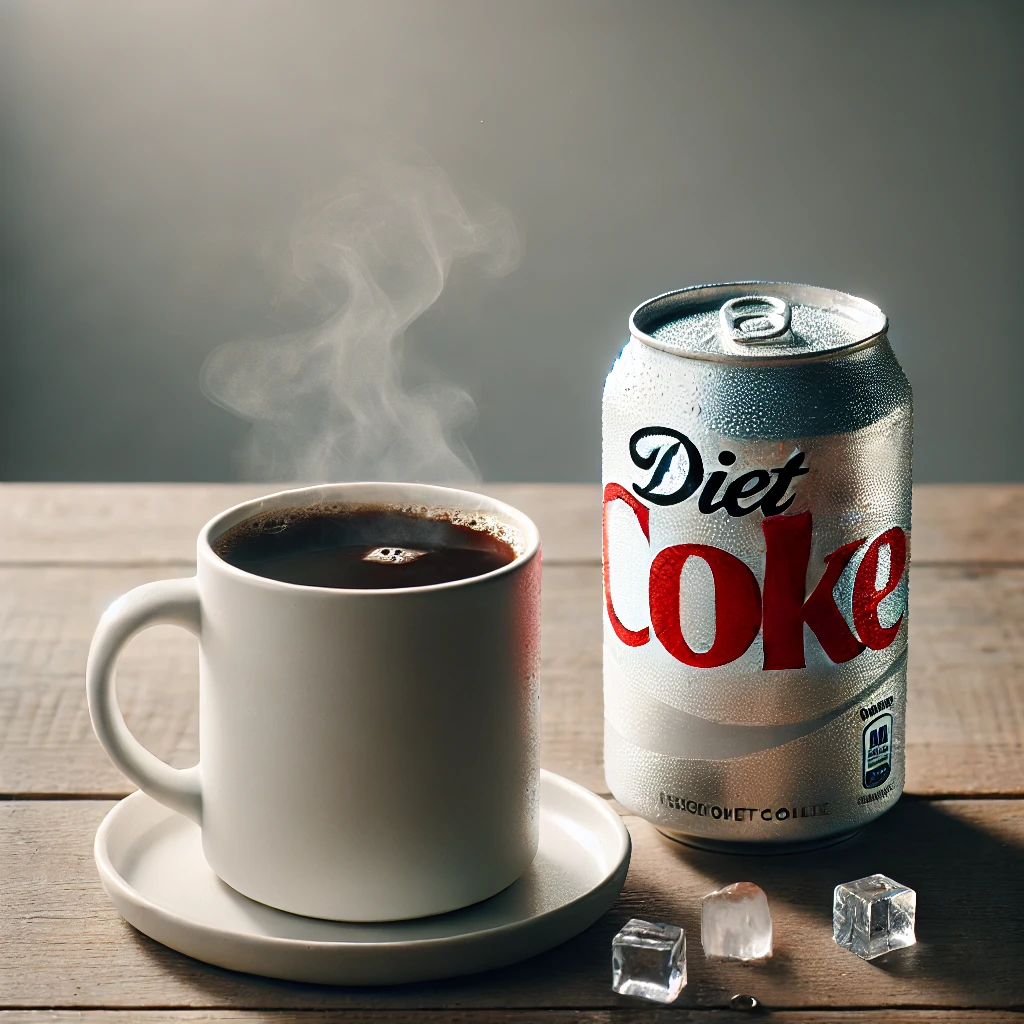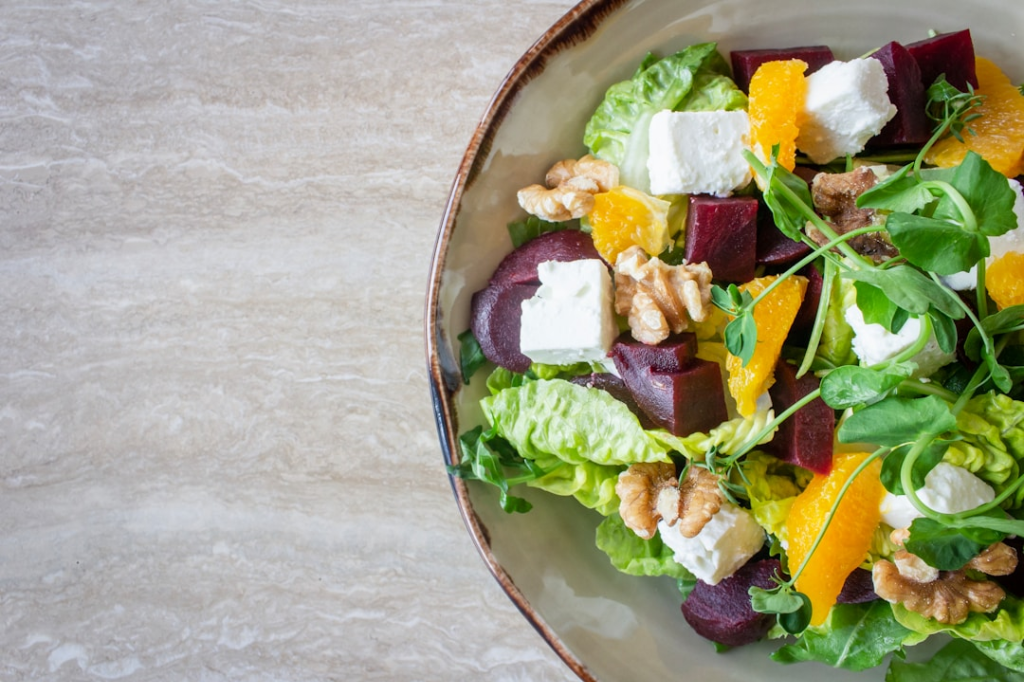Introduction
Diet Coke and coffee are frequently the most popular selections when picking a drink for a quick energy boost. Both drinks have strong fan bases and are highly acclaimed for their abilities to preserve alertness and strength. Which one, however, is actually healthier? It’s crucial to understand how the nutritional content, possible benefits, and risks of these two well-known beverages compare, regardless of whether you’re a Diet Coke or coffee lover. Let’s explore each of their essential pieces to find which is the healthiest decision.

Nutritional Profiles: Coffee vs. Diet Coke
Let’s look at the fundamental nutritional analysis of both beverages before getting into the health benefits and risks:
- Coffee: With only roughly 2 calories per cup, black coffee is nearly calorie-free. It is low in fat, sugar, and carbohydrates and abundant in antioxidants like chlorogenic acid, which are excellent for your health in general.
- Diet Coke: Diet Coke is calorie-free as well, but it derives its flavor from aspartame or sucralose, two artificial sweeteners. It doesn’t offer many good nutrients, even if it is free of calories and sugar.
Calories and Sweeteners
Diet Coke’s zero-calorie composition is a crucial element in customer choice, particularly for individuals attempting to cut down on their caloric consumption.
- Coffee: With just 2 calories per cup, black coffee is still a low-calorie beverage. If you’re not careful, adding milk, sugar, syrups, or creamers may rapidly change this and convert coffee into a high-calorie delight.
- Diet Coke: Although aspartame and other artificial sweeteners give Diet Coke its flavor, the beverage contains zero calories. These compounds replicate the taste of sugar without adding calories to your diet. Although this might seem like an advantage for individuals for controlling weight, there is some controversy regarding the long-term implications of taking artificial sweeteners, which we shall go into more depth about later.
Caffeine Content: Coffee vs. Diet Coke
One of the primary reasons for consumers resorting to Diet Coke and coffee for a quick energy boost is caffeine. However, how much caffeine is in each?
- Coffee: A standard 8-ounce cup of brewed coffee includes around 95 mg of caffeine, but this could range depending on how strong it’s steeped. Coffee is therefore an excellent alternative for people who need a strong energy boost.
- Diet Coke: Compared to coffee, an 8-ounce piece of Diet Coke includes far less caffeine—about 28 milligrams per serving. Although Diet Coke still contains caffeine, it isn’t as powerful or sustained as coffee’s.
Impact on Energy Levels
How do these two beverages affect your energy throughout the day?
- Coffee: Coffee’s greater caffeine content provides a notable rise in attention and alertness. However, if ingested in excess, it can create jitteriness, anxiety, or a breakdown later in the day.
- Diet Coke: Due to its lower caffeine levels, Diet Coke gives a more modest energy boost. However, if you drink too much of it, you may find yourself reaching for extra cans throughout the day to keep awake.
Health Benefits of Coffee
Coffee has been widely studied and is known for offering a variety of health benefits, especially when consumed in moderation.
- Rich in Antioxidants: Coffee includes antioxidants like polyphenols and chlorogenic acid that assist in the body’s fight against free radicals. These compounds have been related to lower inflammation and a decreased risk of long-term diseases including heart disease and numerous forms of cancer.
- Disease Prevention: Regular coffee users may be less likely to acquire Parkinson’s disease, Alzheimer’s disease, and type 2 diabetes, according to studies. Coffee may have these positive advantages due to its anti-inflammatory characteristics.
Potential Health Risks of Coffee
While coffee is packed with benefits, it’s not without its risks.
- Excessive Caffeine Intake: Negative side effects include anxiety, restlessness, sleepiness, and stomach discomfort may arise from ingesting too much coffee. It’s advised to reduce caffeine usage to around 400 mg per day, or about four 8-ounce cups of coffee.
- Acidic Nature: Coffee’s acidic nature could worsen sensitive people’s diseases such as acid reflux or stomach ulcers. For some individuals, ingesting it on an empty stomach may also be troublesome.
Health Benefits of Diet Coke
While Diet Coke lacks the nutrient density of coffee, it does offer some perceived benefits:
- Low or Zero Calories: Diet Coke’s key selling feature is that it contains no calories, which makes it a popular alternative for individuals wishing to cut their calorie consumption without sacrificing on sweetness. If used in moderation, it may be a valuable tool for controlling weight.
- Easy Substitute for Sugar-Coated Drinks: Diet Coke provides calorie-free soda for folks who prefer soda but don’t want to eat the high sugar content of standard soft drinks.
Potential Health Risks of Diet Coke
Despite its zero-calorie appeal, Diet Coke is not without its concerns:
- Artificial Sweeteners: There is continuous disagreement about the long-term safety of artificial sweeteners such as sucralose and aspartame. Concerns have been raised by some studies concerning probable ties to metabolic issues, increased appetite, and even weight gain. While additional investigation is required, some individuals might opt to use fewer artificial sweeteners.
- Metabolic and Heart Health Concerns: Although the evidence is ambiguous, some studies show that regular drinking of diet drinks may be related with an enhanced risk of metabolic syndrome and heart disease. However, moderation is necessary.
Impact on Hydration
Although coffee and Diet Coke both contain water, there are some misconceptions regarding how they affect hydration. Hydration is vital for overall health.
- Coffee: Although coffee has a slight diuretic impact, moderate usage of it doesn’t result in serious dehydration. For the most part, coffee consumers may genuinely credit it toward their normal fluid intake.
- Diet Coke: Like coffee, Diet Coke is hydrating, but because of its high phosphoric acid and caffeine content, drinking excessive quantities of it may promote dehydration.
Bone Health Considerations
Diet Coke and coffee have both been related to concerns with bone health:
- Coffee: Consuming too much coffee could impede the body’s capacity to absorb calcium, which might ultimately damage bones. On the other hand, moderate usage is typically recognized as safe for bone health.
- Diet Coke: Research has revealed that the phosphoric acid in Diet Coke is connected with a reduced bone density and an increased risk of fractures, particularly in women. Overindulgence may create difficulties with bone health in the long term.
Effects on Mental Health
Mood and mental health may also be influenced by coffee and artificial sweeteners:
- Coffee: Due to the antioxidants and caffeine it contains, moderate coffee intake has been connected with enhanced mood and a decreased incidence of depression.
- Diet Coke: The artificial sweeteners in Diet Coke may damage mood and mental health for some individuals. A bigger body of research is required, yet some studies show that aspartame may have an influence on mood stability and serotonin levels.
Impact on Blood Sugar and Diabetes
Though in unique ways, Diet Coke and coffee may both impact insulin sensitivity and blood sugar levels:
- Coffee: Research shows drinking coffee may lessen the risk of type 2 diabetes and enhance insulin sensitivity. If you add sugar or fortified creamers to your coffee, this benefit is lessened.
- Diet Coke: Although artificial sweeteners don’t instantly boost blood sugar, some evidence shows that they may interfere with the body’s ability to control blood sugar, which may gradually enhance the risk of insulin resistance.
Addiction and Dependency
Due to their high caffeine content, both drinks are well-liked, yet there is a potential of dependency:
- Coffee: If a frequent coffee consumer abruptly quits drinking coffee, they may experience withdrawal symptoms such as headaches, irritability, and tiredness. Nevertheless, caffeine is frequently connected to coffee addiction rather than the beverage itself.
- Diet Coke: Although the caffeine in Diet Coke has the potential to induce physical dependency, it may also stimulate psychological cravings when mixed with artificial sweeteners. Once Diet Coke is engrained in their daily habit, some people find it difficult to quit consuming it.
Conclusion
So, which is healthier for you—Diet Coke or coffee? Coffee is the indisputable finest beverage if you’re seeking one that’s rich with health benefits and antioxidants. But moderation is key—drinking too much coffee may have adverse side effects like anxiety and gastrointestinal troubles. Even though diet Coke has no calories, it still carries some hazards, particularly when it comes to artificial sweeteners and metabolic health. The ideal selection ultimately comes down to your dietary patterns, caffeine tolerance, and personal health objectives.
FAQs
Can drinking coffee or Diet Coke help with weight loss?
Both coffee and Diet Coke may assist in weight reduction if eaten without high-calorie additions. Coffee gives significant health advantages, while Diet Coke helps decrease calorie intake without giving nutritional value.
Is it safe to drink Diet Coke every day?
In moderation, drinking Diet Coke everyday is usually regarded as harmless. However, long-term consequences of artificial sweeteners are still contested, so it’s smart to restrict usage.
Which is better for energy: coffee or Diet Coke?
Coffee delivers a larger energy boost owing to its higher caffeine level. Diet Coke delivers a lesser impact but may take many cups to maintain the same energy levels.
Does coffee stain teeth more than Diet Coke?
Yes, coffee is more likely to discolor teeth owing to its darker color and greater acidity. Both drinks might lead to tooth decolorize over time.
Can you drink both coffee and Diet Coke in one day?
Yes, but be aware of your overall caffeine consumption to prevent unwanted side effects including jitters, anxiety, or sleep disruptions. Moderation is crucial!


